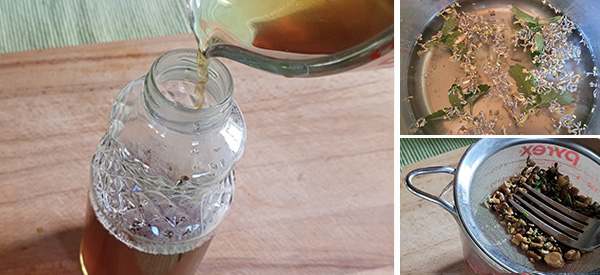
Anti-Anxiety Elixir
Anxiety can leave us feeling exhausted and agitated. It can cause difficulties at work and other important parts of life. Furthermore, it may create unneeded tension in our relationships.
Finding natural ways to recognize and reduce anxiety can improve the quality of life. Likewise, decreasing anxiety can bring joy back into the day. This Anti-Anxiety Elixir may be a wonderful addition to lifestyle changes aimed at reducing anxiety.
Ingredients
The main constituent of this Elixir is Ashwagandha. It is combined with other relaxing herbs which include Lemonbalm, Chamomile, and Lavender.
- Ashwagandha (Withania somnifera) is an evergreen shrub that has been used for thousands of years to help manage stress. Interestingly, it has been shown to reduce cortisol, known as the stress hormone. Not only that, but it decreases depression and improves mood. Most important, for our use today, it has been shown to reduce symptoms of stress and anxiety. Ashwagandha is available through herbal suppliers, health food stores, and online. It can also be found in supplements and teas. The root and fruit are the plant parts most often used.
- Lavender (Lavendula) is well known for its relaxing effects on the mind and body. Similarly, it aids in symptoms of depression. Most notably, for this recipe, it is used to decrease stress and anxiety. Furthermore, lavender is a calming natural sleep aid as well.
- Chamomile (Matricaria chamomilla) is the herb of choice for gentle relaxation and reducing stress. Along with its many other health benefits, chamomile contributes to better quality sleep. High-quality sleep is a primary ingredient to reducing overall anxiety in the body.
- Lemonbalm (Melissa officinalis) is a gorgeous herbaceous perennial which is a potent anti-anxiety remedy, in its own right. It also relieves symptoms of stress. Likewise, it has benefits for symptoms of insomnia and other sleep disorders.
Recipe
- 2 tablespoons dried Ashwagandha root.
- 1 tablespoon dried lavender
- 1 tablespoon dried chamomile
- 1 tablespoon fresh Lemonbalm
- 2 cups high-quality water.
Step 1: Gather the ingredients.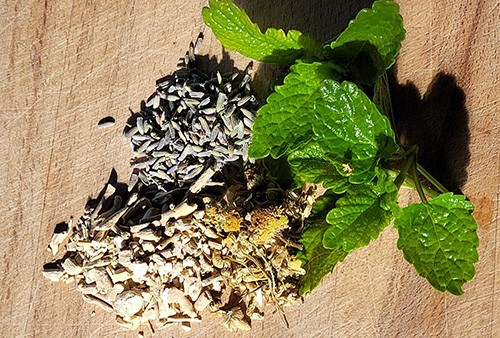
Step 2: Combine ingredients in a pot and add the water.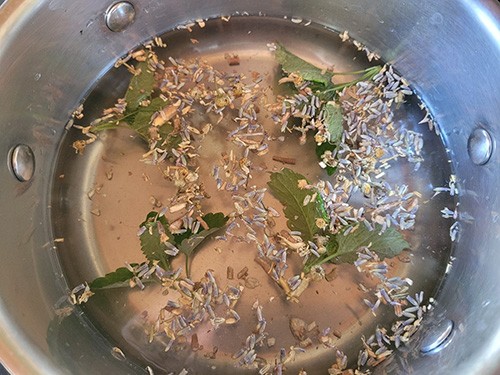
Step 3: Bring the ingredients to a boil.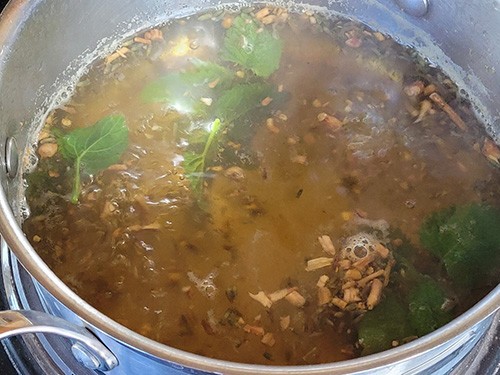
Step 4: Simmer for 10 to 30 minutes.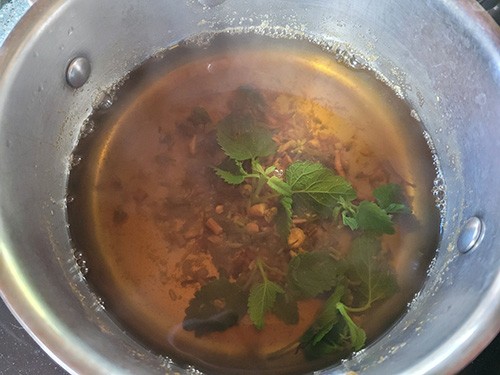
Step 5: Allow to rest for 1 hour, stirring occasionally. If you wish, you could allow this rest period for longer for a stronger extraction. Up to 48 hours if desired.
Step 6: Strain the liquid using a mesh strainer or cheesecloth.
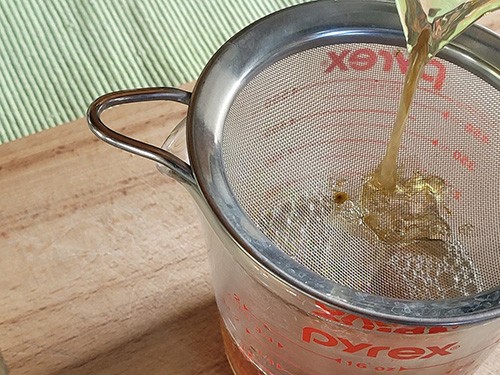
Step 7: Press out any excess liquid.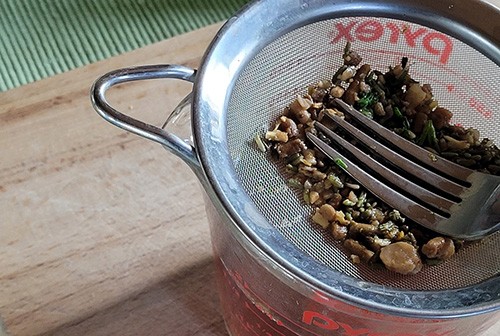
Step 8: Put elixir in a sealable glass container. The Anti-Anxiety Elixir will store in the fridge for 4 to 6 weeks.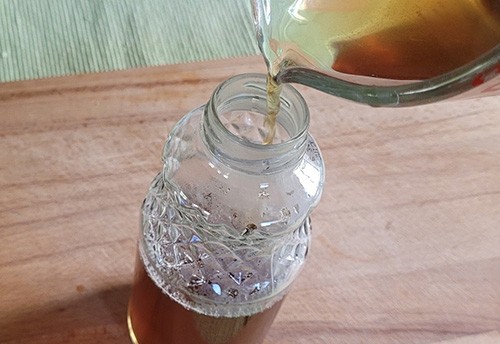
How to Use This Anti-Anxiety Elixir
This Anti-Anxiety Elixir can be used on its own. Preferably, it might be mixed into an evening beverage of herbal tea or warm milk of your choice. It has a lovely floral, almost sweet aroma which is calming on its own. Generally, 1 tablespoon of elixir to 1 cup of warm beverage, or to taste.
The best time to take this elixir is in the evening close to bedtime.
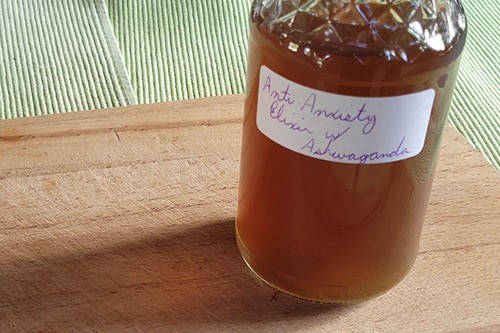
Want to take anti-anxiety ashwagandha at other times of the day?
Alternative ingredients for an Anti-Anxiety Elixir may include ingredients that are less helpful for sleep. For example, Green tea is helpful in reducing stress. It is high in antioxidants which help with cognitive function and overall mental health. Moreover, green tea contains high levels of L-theanine, which has been shown to reduce symptoms of stress and anxiety. Green tea does contain caffeine which may not benefit some anxiety symptoms. It may be worth finding caffeine-free green tea options.
A caffeine-free alternative that mixes extremely well with Ashwagandha is mint. Peppermint, in particular, is energy-boosting. Not only that, but it is also calming and acts as a natural antispasmodic and sedative to help calm your mind and body.
Dosage of Ashwagandha
Evidence suggests that taking 500 mg to 600 mg daily of ashwagandha for at least one month may reduce anxiety symptoms. Additionally, doses of 125 mg to 5 grams daily for one to three months may help lower levels of cortisol, the stress hormone.
Cautions
As with taking any new herb or complementary therapy, check with your healthcare providers. Additionally, if you are taking prescription medication, ensure there are no contraindications with the ingredients of this elixir.
Reducing Anxiety Symptoms
Anxiety can be debilitating. Its symptoms manifest in many ways. These include restlessness, rapid breathing, and racing heart rate. Each person may experience anxiety differently. Other symptoms may consist of an inability to fall asleep or waking up throughout the night. While others may experience constant worry and dwelling on unpleasant feelings or events.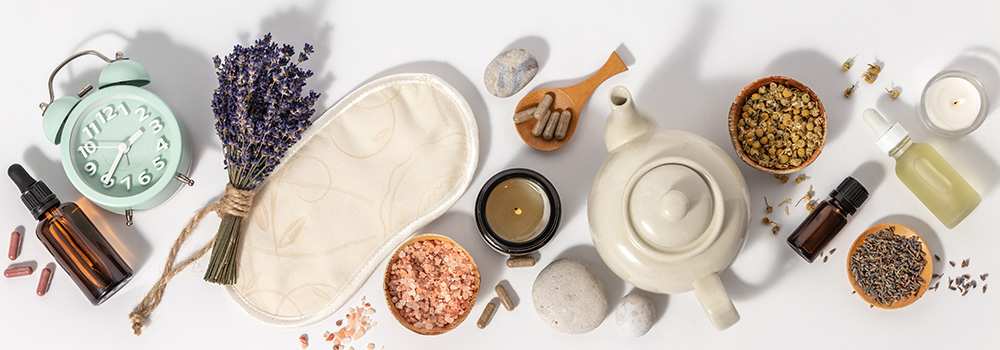
There are many therapies and medications available for the treatment of anxiety disorders. If anxiety becomes severe, chronic, or interferes with your daily life, it may be time to seek professional help. Psychologists and psychiatrists trained in anxiety disorder treatment may be a therapeutic and necessary step.
Learning to reduce anxiety at home may include many methods. A few things to incorporate into a daily schedule to help lessen feelings of anxiety are:
- Sleep Well
- Eat Well
- Spend some time each day outside.
- Get moving.
- Practice happy thoughts.
Some more concentrated strategies might be to include some of the following:
- Learn a meditation practice.
- Learn an exercise routine specific to reducing stress and anxiety such as Thai Chi or certain styles of yoga.
- Soak in an Epsom salt bath, in general, close to bedtime.
Final Thoughts
There are many things we can do for ourselves to reduce anxiety. Sometimes we just need a little extra help, especially if we are facing a particularly stressful life event. Herbal remedies are a gentle and effective way to brighten your outlook and soothe your spirit. Dr. Nicole Apelian’s favorite calming and adaptogenic herbs include Ashwagandha, Lemon Balm, Lion’s Mane Mushroom, and Reishi Mushroom, which we’ve combined in the Anxiety & Stress Tincture.
You may also like:
I Stopped Spending Money At The Pharmacy By Growing These 10 Plants (Video)
30 Anti-Anxiety Remedies You Didn’t Know About


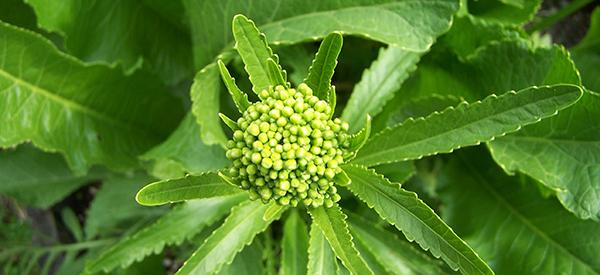
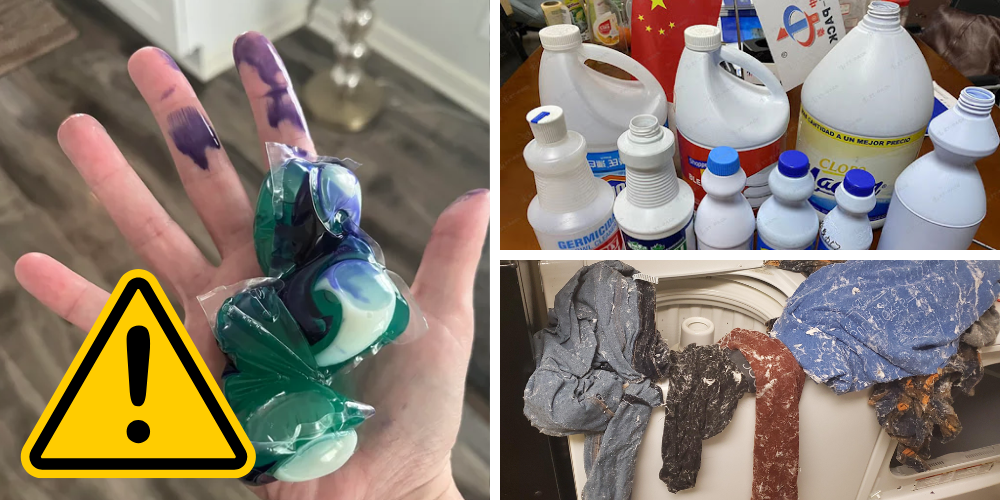
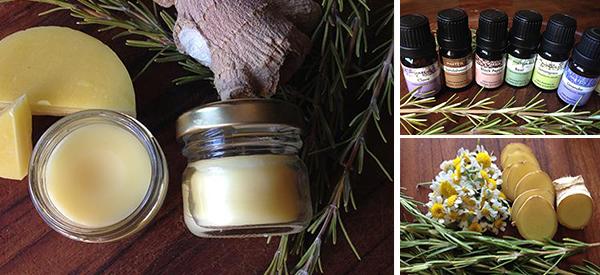
I’m so glad I have this from you. I’m so blessed. Now I have a question. I am not mobile in the winter. Are these ingredients only fresh? Are these found in a vitamin shop as well?
Hi Martena, I have the same question!! I see you asked this question 2 years ago. Can anyone please help answer the question? I am a newbie and need to know where to purchase the ingredients. Or do we need to grow them. It is Oct 1, 2024 and fall is upon us so growing them is not an option for me. Please help! I have both books and would love to start making tinctures. Thank you.
Mountain rose herbs is one source
I must give a huge shout-out to Lemonbalm. I had a couple of close calls with crashes in the winter of 2017-18 to the point where I had extreme anxiety to ride in a car. I started lemon balm pills to keep my cold sore outbreaks at bay and noticed immediately that I could ride in a car without a panic attack. Literally a lifesaver for me. I am excited to make this drink! We have lemon balm growing on our property which I feel is a gentle hug from mother nature and a wink from God.
Oh car crashes are so scary. Years ago I was hit by a semi. My car came in contact with it about seven times. Around and under then head on with a pick up. Took me years to be able to drive without crying. Wish I knew about lemongrass then. He hon just keep driving and over come you can do it.
We have so much lemon balm over here that it’s a joy to weed-wack it every other week or so, I’ve always felt calm and happy cutting square yards of invasive lemon balm and smelling the wonderful fresh aroma of it. Looks like there might be an herbal remedy reason for feeling so great trying to get rid of it! Of course it immediately grows back… we have about a 1/4 acre of lemon balm and it spreads farther out every year. Now I’m super-glad to have it!
Yeah…I asked my doctor if Ashwagandha would be contraindicated with my current meds. He said he’d never heard of it and therefore could not offer an opinion…okay thanks Doc! It’s been around for 3000 years and he couldn’t be bothered… There’s not much I can run past my doctor….he’s still pushing statin drugs every time I go in there.
I am on anti depressants and tried ashwaganda. It didn’t mix well.
Our experience is that doctors don’t know much about the medications they prescribe – particularly contra-indications. We always talk to our pharmacist about this as their training focuses on that specialized knowledge.
Yep. Doctors will do everything to get you on a drug, especially the statins. After this Covid stuff, I have very little trust in u educated or money doctors.
Unless your md is a herbalist, there is no way he would know.
I want to say THANK YOU !! You are the first holistic company I bought something from that did not flood my inbox with upgrades, more products and teasers about recipes just to find out it costs again.
I love your book as well as what you stand for. I am a Reiki Master Healer/ Teacher and am very excited about starting my collection of holistic remedies… Thank you!!! Jenna Pearce
Thank you
What a great article! I can’t wait to make the lavender cream.
Can this be made as a tincture for a longer shelf life?
See my message below …I make most everything into a tincture for long shelf life, although I do fresh decoctions weekly for my health regime.
Hi … I am a long time herbalist, 20 plus years. I. make weekly decoctions (which your recipe is), I have never heard of a decoction lasting 4-6 weeks in the fridge. One week is all I get out of it, soon after a week a mold may appear. What is your secret?🤔☺️
I am a long time herbalist as well. I would NEVER use a decoction for 4-6 weeks. I’m with you, a week at most. I studied herbalism under a master herbalist who is also a naturopathic doctor. He, too, says to never keep a decoction for more than a week. He also says boiling herbs kills the medicinal properties…so for me that’s 2 strikes against this article.
Yes folks, Please do not make this deoction and keep in for several weeks…it will go bad way before that. Learn about elixirs and how they are made in order for a longer shelf life. This article is a bit irresponsible to write.
So what do we do with the herbs if we shouldn’t boil them?
Ok Paula C if you don’t boil it then what? Don’t put something out there if you don’t have an answer. 🤷♀️ you studied herbalism under a master herbalist…
your page is not printing
Hello Nicole, just an FYI on this Elixir. I have Lupus and Ashwagandha is not to be taken with someone who has Lupus. It causes a violent reaction of vomiting, body sweats and pain in the abdomen. First hand experience here as I tried to take Ashwagandha 3 times because I did not look up the herbal side effects with Lupus. I am much wiser now. So this is for ALL people who just read something and try it without seeing if it interferes with an existing condition or even medication. Stay WISE and Stay Healthy!!!!
I’m so sorry to hear that you have Lupus – look into studies surrounding gut microbiome- this may help you
I, too, have lupus, but have no negative interactions with ashwagandha. I’ve been taking it for years now.
Will start doing this today and update y’all! But I got a good feeling about since the anti-anxiety pills have been doing their magic ever since you posted the article!!
Can I use all fresh herbs in this recipe?
I have diverticulosis and I have found the two times that I tried Ashwagandha I soon after got a stomach upset then had to run to the toilet several times.
Hi Jo, have you tried Aloeride yet for your diverticulosis? Organic herbal remedy in capsules. The people there are really knowledgeable.
forgot to say in previous comment. What can I use in place of Ashwagandha please?
As I go through these plants I realize they do not grow in Australia. A lot of our wild mushrooms are poisonous, and we don’t have the trees you write about. We do have tea trees and eucalyptus trees both used in ointments though. It is difficult to know how to substitute.
Hi Carolyn Oors, I too live in Australia. Eucalyptus is great as an anti fungal and natural antiseptic. If you take about 30 leaves (use the leaves off a tree that smells like Eucalyptus because there are different varieties) scrunch the leaves once in your hands, just cover with cool water in a pot, bring to simmer for 20 minutes only. Not boil but simmer. Then strain the leaves out and let the infused water cool. Bottle and keep in a dark dry cool place. Maybe the fridge. Use on cuts, infected wounds, rain scald and hoof problems with horses, its good for man or beast. DO NOT TAKE INTERNALLY. Eucalyptus is poisonous if taken internally. This is a recipe I got from an old stockman who got if whilst droving in the 1930’s from the Aboriginal drovers.
Lemon balm and mothers wart are my go to for on the spot help… But rhodiola rosea root is pretty good for a few stressful days or for week or 2 around the holidays lol
Would this work without the chamomile, as I am allergic to this.
I’m looking forward to starting my herbal approach to health.Been on many pills over the years for pain,stress and depression.I hate taking them as I no there doing my internal organs damage.Will start slowly and build up .Would love to eventually come off Western meds.They are the killer.
I have type 2 diabetes, wish ingredients better for me and my organ?
If a person is going to be in a situation where they can’t refrigerate this elixir, is it possible to make this as a tincture?
Has anyone heard of Ashwagandha causing hot flashes?
I cannot find the book I bought
Is there a NON western medical advice channel that can advise on drug interactions between pharmaceutical drugs and herbs?